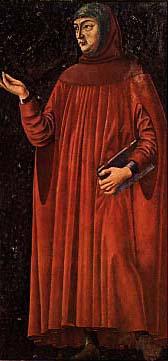

Italian poet and humanist, Francesco Petrarqua was born in Arezzo in 1304 and died in Arqua, near Padua, in 1374.
Because of problems with the Guelfe faction the family of Petrarch fled Florence for Provence. They arrived in Avignon in 1311. At this time, the Pope's presence here attracted a large population, creating housing shortages. Unable to find lodging, the family left for Carpentras.
Petrarch studied law in Montpellier and Bologne, at the same time absorbing the written works of Antiquity, as well as contemporary poets. In 1325, he returned to Avignon, attracted by the papal court. He abandonned his studies of law and entered a minor monastic order.
At this time he rubbed elbows with eminent notables on whom his cultural knowledge made an impression. As much as he reproached the popes for having left Rome, the court attracted him.
As well, he met Laure de Noves in 1327, who inspired in his heart a mad and impossible passion - a symbol of divine perfection.
He entered into the service of Cardinal Giovanni Colonna, travelled in Europe, wrote, (De viris illustribus notamment) and read.
He then withdrew, for the first time, to the Vaucluse to meditate, far from the bustle and excesses of the large cities.
In 1341, he was crowned poet of poets at the Capitol in Rome. It should be noted that Paris had offered him the same distinction, thus thanking him who had brought about a rennaissance of written work, the rediscovery of old and forgotten texts and opened the way for the Humanists.
Petrarch considers, at this time, settling in Italy but political upheaval forced him to return to Avignon. It is at this moment that he writes le Canzoniere, over 300 poems, mostly sonnets sonnets, collected in Rimes et Triomphes where we find the ideal, platonic love inspired by Laure.
In 1347, Cola di Rienzo, who was in exile in the City of the Popes, was elected to the Tribune in Rome. Petrarch, partisan of popular governments, and that of di Rienzo for many years, took leave of the cardinal Colonna and parted for Rome to support him. The death of di Rienzo in 1354 in an uprising interrupted his voyage. Petrarch established himself in Milan until the plague forced him ro flee. He went to Venise, Padua and finally Arqua, where he died in 1374.
To see : the François Petrarque museum and library in Fontaine de Vaucluse.
Where to sleep?
Maison Chenet, Entre Vigne et Garrigue
165 EUR/night*
Bed and breakfast - Avignon and the surroundings
160 EUR/night*
Bed and breakfast - Avignon and the surroundings